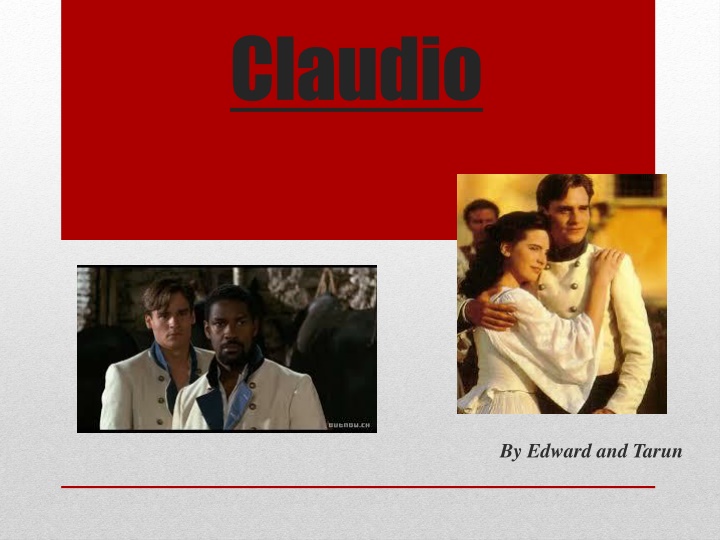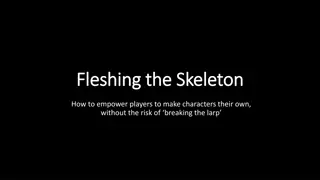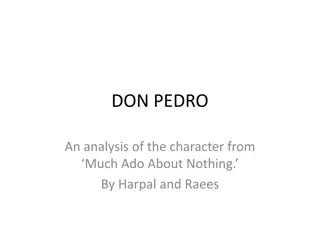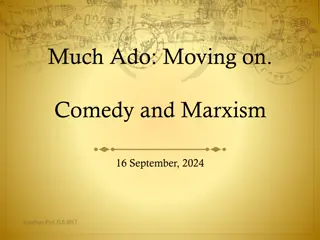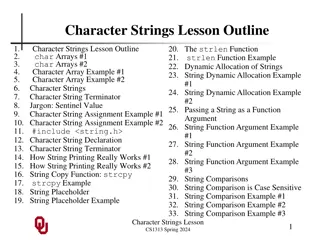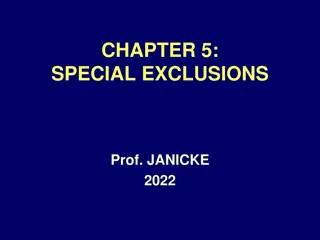Analysis of Claudio's Character Development in "Much Ado About Nothing
In Shakespeare's "Much Ado About Nothing," Claudio's character undergoes significant development. Initially respected for his valor, he reveals his immaturity in love, possessiveness over Hero, and later, a heartless side. The metaphorical language used highlights his journey from a lion on the battlefield to a lamb in matters of the heart, ultimately leading to a drastic decision that showcases his impulsive and callous nature.
Download Presentation

Please find below an Image/Link to download the presentation.
The content on the website is provided AS IS for your information and personal use only. It may not be sold, licensed, or shared on other websites without obtaining consent from the author.If you encounter any issues during the download, it is possible that the publisher has removed the file from their server.
You are allowed to download the files provided on this website for personal or commercial use, subject to the condition that they are used lawfully. All files are the property of their respective owners.
The content on the website is provided AS IS for your information and personal use only. It may not be sold, licensed, or shared on other websites without obtaining consent from the author.
E N D
Presentation Transcript
Claudio By Edward and Tarun
I find here that Don Pedro hath bestowed much honour on a young Florentine called Claudio Messenger
Who: Messenger When: Act 1 Scene 1 Where: Town Claudio is highly respected by Leonato and the messenger because of his contribution in the civil war and his partnership with Don Pedro, Prince of Aragon.
..doing in the figure of a lamb, the feats of a lion. Messenger
Who: Messenger When: Act 1 Scene 1 Where: Town The metaphor used shows us how young and vulnerable Claudio still is. He may be a lion on the battlefield, but he is still a lamb . While he has experience in battle, he has no experience yet with love, which is shown with his immature behaviour towards Hero.
Can the world buy such a jewel? Claudio
Who: Claudio When: Act 1 Scene 1 Where: Town The metaphor used jewel emphasises Claudio s love for Hero with the use of such a precious object. The word buy also tells us that women are regarded as property and that men own them, which links with the theme of the status of women in the play.
Who: Claudio When : Act 3 Scene 2 The short, sharp sentences shows Claudio s decisiveness, but also his careless ability to change his mind before thinking about what was actually said. The word shame suggests that Claudio doesn t just want to break with Hero, he wants to publicly humiliate her, which shows a heartless side to Claudio that we haven t seen so far.
Who: Claudio When: Act 4 Scene 1 Where: Wedding With the use of a contrast in language and tone, Shakespeare highlights Claudio's fury and urge to make sure Hero is humiliated. This is shown by Sweet Prince which Claudio uses, referring to Don Pedro, but then refers to Leonato by his name, which suggests he is rude and disrespectful to his almost father in-law.
Who: Claudio When: Act 4 Scene 1 Where: Wedding By referring to Hero as a piece of rotten fruit, Claudio implies that what was once sweet and pure, is now spoiled and nasty. (Just as Eve was tempted in the Garden Of Eden by fruit that turned out to be evil, Claudio was first attracted and then repulsed by the "impure" Hero.)
Who: Claudio When: Act 4 Scene 1 Where: Wedding This quote, at the wedding scene, furtherly emphasises Claudio s bitter and uncaring personality, especially because of the fact that he is mistaken, and Hero is innocent.
Who: Claudio When: Act 5 Scene 1 Where: When Dogberry reveals Hero s innocence Claudio drank poison which suggests that Claudio wasn t thinking straight when he was tricked. This can be interpreted as a confession from Claudio, showing his more modest side.
Who: Claudio When: Act 5 Scene 4 Where: Hero s funeral After Claudio has realised he is mistaken, his character changes to a more modest one. Compared to Claudio s quotation in Act 1 Scene 1 , Can the world buy such a jewel? , Claudio has now asked Hero for her opinion, and allowed her to make her own choice, which shows us Claudio is becoming more forgiving and accepting that he had made a mistake.
A halting sonnet of his own pure brain, fashiond to Beatrice Claudio
Who: Claudio When: Act 5 Scene 4 Where: After Hero accepts Claudio s apology, and the couple are back in a relationship, we see that Claudio s character changes into one that we saw towards the beginning of the play, an amusing and cheerful character, when he talks to Benedick about his relationship with Beatrice.
